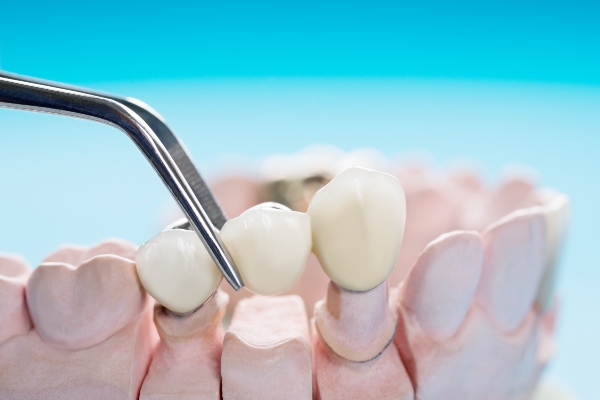 A dental bridge has been a preferred tooth replacement option for decades. These restorations restore both function and aesthetics after tooth loss. For patients exploring their tooth replacement options, understanding the different types of dental bridges can help determine the best choice for them.
A dental bridge has been a preferred tooth replacement option for decades. These restorations restore both function and aesthetics after tooth loss. For patients exploring their tooth replacement options, understanding the different types of dental bridges can help determine the best choice for them.
Traditional dental bridge
The traditional dental bridge, the most common type, consists of a false tooth, known as a pontic, held in place by crowns cemented onto the adjacent natural teeth. This type of bridge is durable and provides excellent stability for chewing and speaking. However, placing a traditional bridge requires reshaping the neighboring teeth to accommodate the crowns. This option provides reliable and long-lasting results for patients with strong, healthy teeth on either side of the gap.
Cantilever dental bridge
A cantilever dental bridge is similar to the traditional design but requires support from only one adjacent tooth. This type of bridge is ideal for situations with only one natural tooth next to the gap left by the missing tooth. While effective, cantilever bridges are unsuitable for areas of the mouth that experience significant chewing pressure, such as the molars. A general dentist can determine if this option is appropriate based on the location and condition of the surrounding teeth.
Maryland bonded bridge
The Maryland bonded bridge uses a more conservative approach by bonding the pontic to the back of the adjacent teeth with a metal or porcelain framework. This method eliminates the need for crowns, preserving the natural structure of the neighboring teeth. Maryland bridges replace missing front teeth, as they are less suitable for areas requiring significant force. They provide a natural-looking result and are often chosen for their minimally invasive placement process.
Implant-supported dental bridge
The newest type of dental bridge is the implant-supported dental bridge, which is anchored to dental implants rather than natural teeth. Dental implants act as artificial tooth roots, providing unmatched stability and preventing bone loss in the jaw. For patients seeking a highly durable and stable option, the implant-supported dental bridge is an attractive choice.
The implant-supported bridge is particularly beneficial for individuals missing multiple teeth in a row. While the process involves multiple appointments and a longer healing period, the results are highly functional and aesthetically pleasing.
Choosing the right dental bridge
Each type of dental bridge has its advantages, and the ideal choice depends on factors such as the number of missing teeth, the condition of surrounding teeth, and the patient’s overall oral health. A general dentist will evaluate the patient’s unique needs and recommend the most suitable option. By replacing missing teeth with a dental bridge, patients can restore their smile, improve their ability to chew and speak and maintain proper alignment of the surrounding teeth.
The right dental bridge for you
Exploring the options for a dental bridge allows patients to find a solution that meets their functional and aesthetic needs. From traditional designs to implant-supported bridges, each option provides unique benefits. Consulting a general dentist is the most effective way to determine your best fit.
Request an appointment or call Haven Dental Care at 203-800-9909 for an appointment in our East Haven office.
Related Posts
A dental bridge can simplify tooth replacement so patients can restore their smiles. However, many are nervous about getting the bridge because they know that it involves modifying the other teeth near the gap.Fortunately, the dental bridge procedure is quite simple and is usually performed on an outpatient basis. This means you can go home…
A dental bridge is an effective solution for replacing missing teeth and restoring function and appearance. When considering a dental bridge, patients often encounter two main options: traditional and Maryland bridges. Understanding the differences between these types can help patients make an informed decision tailored to their specific dental needs and preferences.A traditional dental bridge…
A dental bridge is a popular restorative dental solution that replaces one or more missing teeth. It not only restores functionality but also enhances the appearance of the smile. Understanding the process of getting a dental bridge can help patients feel confident and prepared as they work toward restoring their oral health.The process of getting…
